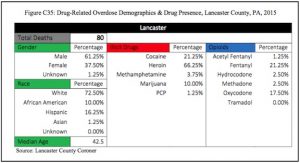With a health problem this severe, and growing this rapidly, you’d imagine Pennsylvania lawmakers might want to do something about it. Think again.
Pennsylvanians are dropping like flies, yet these guys in the legislature only want to work six more days in the last three months of the year. In those three months, an estimated 900 Pennsylvanians will die of opioid addiction.
Nothing better demonstrates the unfitness of Pennsylvania lawmakers to deal with a severe problem in a timely manner than the state’s heroin and opioid epidemic.
Several horrific incidents in the news this week underscore the urgent need for action in the growing heroin / opioid health crisis.
- In Johnstown a police officer overdosed on opioids while on duty, and was revived by a dose of the anti-opioid drug Narcan. The Johnstown Tribune-Democrat reports that a 20-year-old Johnstown heroin addict a few days later overdosed on heroin in the parking lot of the Johnstown YMCA, and also had to be revived with Narcan.
- A Clarks Summit PA attorney and her son, both heroin addicts, were found dead in their home from what is believed to be heroin overdoses. The bodies of attorney Bonni Shelp, 57, and her 21-year-old son, Daniel Singer, were found among the litter of heroin abuse, like glassine envelopes. “What I think would be fair to say is this case shows that addiction issues can really ravage an entire family,” says Lackawanna County DA Shane Scanlon. Shelp was “a well-known local attorney and former county guardian ad litem,” the Scranton Times-Tribune reports. (A guardian ad litem is appointed by the court to investigate the “best interests of a child.”) Both Attorney Shelp and her son battled heroin addiction for “quite awhile,” DA Scanlon says.
- In rural Clearfield County the body of a Guatemalan man, Boris Anavisca-Reyes, was found slumped over a guardrail on Route 153. His body was stuffed with up to $500,000 worth of heroin packets, police say. Anavisca-Reyes was a suspected “drug mule” who had swallowed the heroin packets to transport them. At least one of the balloons stuffed with heroin burst, killing him.
And these shocking stories are not just isolated, anecdotal incidents.
By any measure Pennsylvania’s heroin / opioid crisis is a snowballing health emergency that must be quickly and competently addressed by state government.
Consider the following:
- A July 2016 DEA analysis found 3,383 drug-related overdose deaths reported in Pennsylvania in 2015, an increase of 23.4 percent of deaths (2,742) reported in 2014. There were overdose deaths in nearly every county in the state. Lancaster County, for example, reported 80 overdose deaths in 2015.
- According to the FBI’s uniform Crime Report, Pennsylvania ranked 8th in drug overdose deaths per capita in 2014. And that number is growing alarmingly. (Drug overdoses now kill more Americans each year than either car accidents or guns.)
- The incidence of drug overdose deaths in Pennsylvania has risen 14 fold in 35 years, according to a March 2016 study by the University of Pittsburgh Graduate School of Public Health.
- While most of the drug-related deaths involved heroin (54.6 percent), prescription opioids are a growing part of the problem, with 27 percent of deaths caused by Fentanyl, up almost 93 percent from 2014, according to the DEA report.
With a health problem this severe, and growing this rapidly, you’d imagine Pennsylvania lawmakers might want to do something about it.
Think again.
This summer, with the November general election bearing down upon them, Gov. Tom Wolf and GOP legislative leaders stood shoulder-to-shoulder in the capitol rotunda, and promised a special legislative session to address the crisis.
GOP leaders quickly back-peddled, saying there wasn’t enough time in the legislative calendar for such a session.
But there are other, monetary, considerations.
A study by the Associated Press and the Center for Public Integrity found $880 million in political donations from the pharmaceutical industry to U.S. lawmakers in the last decade. By contrast, groups advocating limits on opioid prescriptions spent only $4 million.
From 2006 to 2015, Pennsylvania lawmakers receiving the most donations from Big Pharma include, at the top of the list, Lancaster County’s own retiring congressman, Joe Pitts. The top ten recipients are:
- Con. Joe Pitts $ 276,000
- Con. Jim Gerlach $ 268,677
- Con. Allyson Schwartz $ 256,972
- Sen. Bob Casey $ 206,000
- Con. Charlie Dent $ 159,600
- Sen. Arlen Specter $ 159,350
- Sen. Pat Toomey $ 148,067
- Con. Patrick Meehan $ 138,650
- Con. Patrick Murphy $ 119,901
- House Republican Campaign Cmte Of Pennsylvania $ 111,850
Notable Pennsylvania state legislative leaders and their rankings on this list include:
- State Senate President Joe Scarnati $71,500; 24. State House Speaker Mike Turzai $37,200; 25. State Sen. Jake Corman $35,000
This week, now that a special session with swift legislative action was ruled out, Gov. Wolf was allowed to address both houses of the legislature.
“We are all aware of the opioid epidemic facing Pennsylvania — a public health crisis the likes of which we have not seen. Every day we lose ten Pennsylvanians to the disease of opioid addiction,” Gov. Wolf told the joint session.
“It affects each and every Pennsylvanian and entire communities throughout our commonwealth. In the past year alone we have lost over 3,500 Pennsylvanians — a thousand more lives than the year before.”
“And we are not alone. According to the Centers for Disease Control, prescription opioid deaths in the United States have quadrupled since 1999. It’s a crisis that has been building for years right here in Pennsylvania, and all across the country.”
But what to do about it?
Gov. Wolf requested swift passage of bills already in the legislative hopper.
But nobody expects much action.
The legislature’s two-year session ends in November, and legislative leaders complain they only have six working days scheduled between now and then to get anything done.
Pennsylvanians are dropping like flies, yet these guys in the legislature only want to work six more days in the last three months of the year. In those three months, an estimated 900 Pennsylvanians will die of opioid addiction.
It should be noted that Pennsylvania’s legislature is the second highest paid in the nation. These guys rake in $84,012 a year, plus a $157 a day per diem rate, and generous benefits.
Though Pennsylvania supposedly has a “full-time legislature,” the state House calendar shows only 60 voting days over the course of the entire year, with only six days in session, for example, in September.
By contrast, heroin and opioid dealers will take no days off.
As Gov. Wolf points out, at last year’s rate of 3,383 opioid deaths (which is sure to grow in 2016), an average of almost 10 Pennsylvanians will die of opioid overdoses for every day the overpaid and underworked state legislature dithers on this health crisis.
Who else has a “full-time” job that pays $84,000 a year, plus generous benefits, to work just a fifth of the calendar year, and allows at least 3,383 people a year to die, while taking money from the killers?
As we see from this crisis, Pennsylvania’s overpaid and underworked legislature is woefully unfit and unprepared for the challenge of addressing anything quickly, honestly and competently.




Death of opioid use is suicides to happen without any tale of why, it’s just because……. nothing else will do !!! In the blind till it happens
To some people this is their way of dealing with life and as long as your giving them a cure they will not stop. You can not save someone that wants to die, so stop trying and stop wasting the money.
NEWSLANC EDITOR: Those who work in the field of Harm Reduction – methadone centers, detox centers, medication with buprenorphine, syringe exchanges – know of many addicts in remission, often for the rest of a long life. Yes, people will “fall off the wagon” just as smokers have difficulty giving up nicotine addiction. But they often succeed at a later try.
Lives can be saved and salvaged. And syringe exchanges in Reading, Lancaster, Harrisburg and now in York area an entry point for helping addicts to be restored to work and loved ones.
This crisis crosses ALL socioeconomic lines. Maybe if some of the boneheads that “represent” us have the experience of a child going through this starting with a doctor’s prescription, they’ll start getting it.
Connecticut death this year via drug overdose 900, and in PA 3383. PA population 12.7 million, Connecticut 3.6 million. Attached says prescription pain killer Fentanyl, made by Janssan Pharma & ALZA Corp, makes the drug dealer a million dollars per kilogram, Heroin about $50,000. Fentanyl from wikipedia – “Illicit use of pharmaceutical fentanyl and its analogues first appeared in the mid-1970s in the medical community and continues in the present.”
http://www.wfsb.com/clip/12749697/state-officials-continue-to-try-to-combat-heroin-epidemic
This is terrible! While these asses crunch numbers to see what it will cost the government, more and more people are dying! This is unreal how the entire government has either ignored this or just refused to help!
This Congress sucks! And I had some accountant from the state tell me that they are waiting on reports of what it will cost to start treatment and what will be their options. Which means, what is the cheapest way they can deal with this.
You can help give them an option besides death. They need to try something. And now, not later!
Oh, but the people of Pennsyltucky will vote them right back in for more of the same.